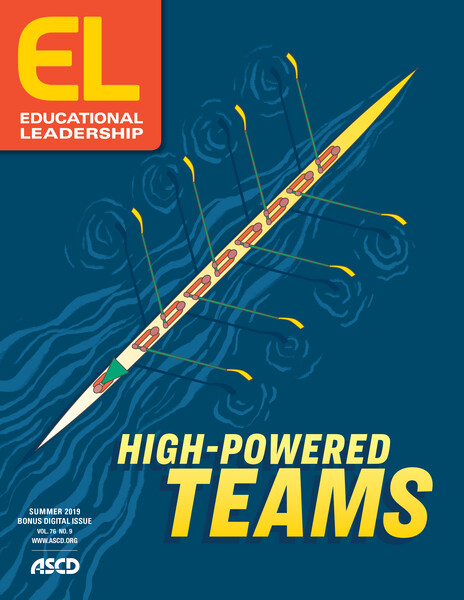Schools in the U.S. have often been said to have an egg-crate culture, with teachers isolated in their separate classrooms. But that's been changing in recent years. Professional learning communities, once a novelty, are now commonplace. Cross-department task forces and leadership teams proliferate. The value of teacher collaboration is now widely acknowledged.
Yet there's also a growing sense—backed by some hard evidence—that these various efforts to bring educators together haven't been as impactful (or as rewarding) as hoped. A survey conducted for the Gates Foundation a few years ago, to take one example, found that teachers weren't particularly keen on their PLC experiences. It's almost as if educators, coming out of their egg crates, have been discovering what the rest of the workforce already knew: Without the right structure and sense of purpose, team projects can be a drag.
This special digital issue of Educational Leadership takes a closer look at this problem and offers ideas and solutions to help educators regain and build on the potential of teamwork in schools. A central message is that just bringing people together, no matter how noble or urgent the purpose, or how longstanding the format, is not enough. Effective group work takes ongoing deliberation and care. As you explore this issue, you might ask yourself: How can my school be more intentional in planning and structuring teams and meetings?
The authors presented here offer plenty of helpful suggestions. Kathryn Parker Boudett and Meghan Lockwood discuss the importance of establishing norms for meetings so that teams have clear expectations for how they will work together and avoid "inequitable patterns" of communication. Allison Rodman and Jill Thompson, meanwhile, identify the common ways, through inertia or lack of focus, that school teams often sabotage their own work. ("Failing to follow through" sound familiar to anyone?) Collaborating for Change
Of course, if team-based approaches in U.S. schools haven't yet lived up to their promise, there may be larger structural issues in play as well. As Marc Tucker explains in his article, school systems in other countries give educators far more time and support (and autonomy) for collaborative planning and problem solving. And as Megan Power notes in her piece on a newly opened, design thinking-based school, traditional school structures—from master schedules to building layouts—aren't necessarily conducive to intensive teamwork. Such observations, we hope, will spark conversation and reflection on the organization and purpose of schools in the 21st century. What should change? How can schools better support educators as knowledge workers who learn from each other and whose professional development is "woven into the job itself"? How might you and your colleagues nudge the process along in your school system? Guiding Questions
➛ How could norms, implemented intentionally, guide the work of a school or district team you're on?
➛ Which of the Meeting Wise norms would be most applicable to your team? Are any noticeably missing in your team's work?
➛ Based on what you read, how could your team respectfully "norm check" one another to ensure accountability?
➛ If a team you're on right now is not performing as well as it should, what do you think is most hindering its progress?
➛ Of the four key processes the authors mention, which do you think is the most difficult to implement? Which is the easiest? Why?
➛ Think of a time—either on a team or individually—when you felt motivated by seeing success from your efforts. How did that drive you to improve and continue your work? How did it make you feel?
➛ Do your PLC meetings tend to focus more on logistics—what will be taught and when it will be taught—than on how a lesson or activity will be taught? If so, how could you make the switch?
➛ Venables suggests that for each time PLCs review and analyze student work, they should review and analyze teacher work twice. How could you make teacher work the focus of your PLCs?
➛ Work with your team to analyze a learning activity against the included rubric. Could the rubric be a helpful tool for futurePLC meetings?
➛ Consider the school environment you work in: Are teachers treated as professionals who can work together to solve problems, or more like assembly-line workers who have little say in overall improvement efforts? Do they have a voice in decision making, or in refining their practice?
➛ Tucker says all professional learning communities should have "serious assignments" so that meetings don't just devolve into "talkathons"? What might this look like in your school or district? What assignments would you tackle first?







